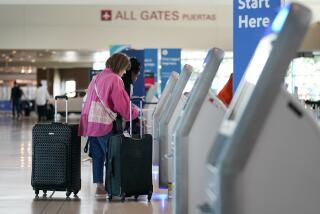Pilots Ask Congress to Raise Retirement Age
- Share via
Hundreds of U.S. airline pilots are asking Congress to raise their mandatory retirement age to 65, saying the change won’t threaten safety and would give workers more time to recover money lost to pension cuts.
The Federal Aviation Administration since 1959 has required that airline pilots retire at age 60. Southwest Airlines Co., JetBlue Airways Corp. and pilots at other carriers, including those with pension troubles, want to extend the limit. Larger airlines and their unions oppose a change.
“I regard it as a moral issue,” said Herb Kelleher, Southwest’s 74-year-old chairman, who was flanked by about 30 current and retired pilots on Capitol Hill on Wednesday. “We have a bunch of splendid pilots right behind me who would be perfectly safe and totally competent if they were able to fly in our cockpits today.”
Some of the biggest U.S. carriers such as US Airways Group Inc. and United Airlines have moved to terminate pensions as the industry posted combined losses of $33 billion in the last four years. Others, including Delta Air Lines Inc. and Northwest Airlines Corp., have sought to spread payments over a longer period to keep plans viable.
Paul Turner, 58, a US Airways pilot, said his expected retirement check fell to about $38,000 a year from $90,000 when the airline terminated pensions in its first bankruptcy reorganization of 2003.
“I cannot afford to retire at age 60 because of what happened to me,” said Turner, who lives in Charlotte, N.C. “I have to go out and find some other work and start over at that age.”
Legislation in the U.S. House and Senate has gained momentum because of pension troubles, Turner said. Pilots whose plans are terminated and taken over by the Pension Benefit Guaranty Corp. may get 33% less in annual payments because of the age-60 rule, he said.
Increasing the retirement age “could be positive” for pensions, said Sen. James M. Inhofe, the Oklahoma Republican who sponsored legislation to raise the limit. “If people are able to work a little bit longer, maybe time is in the favor of solvency.”
UAL Corp.’s United, the world’s second-largest carrier, won Bankruptcy Court approval this month of a plan to terminate its pensions and turn them over to a federal agency. The change means $3.2 billion in lost benefits for employees.
The other three largest U.S. airlines, AMR Corp.’s American, Delta and Northwest, back legislation that would let them spread out payments to pension plans to avoid potential bankruptcy filings.
Past efforts to raise the age stalled from a lack of union and industry support, such as in 2001, when then-Sen. Frank H. Murkowski, an Alaska Republican, said an increase would stem a pilot shortage. The FAA, which backs the age-60 rule, will continue to decide the matter unless Congress acts.
The rule “has served the industry well,” FAA spokesman Les Dorr said. “There’s just no scientific consensus that would give us a basis for changing that age-60 limit,” he said. The agency has said pilots’ decline in cognitive functions and increased risk of illness over age 60 may have an effect on safety.
The Pension Benefit Guaranty Corp., the U.S. agency that takes over failed pensions, can’t ensure pilots get the maximum benefit unless the retirement age is 65, said Jeffrey Speicher, an agency spokesman. Sen. Daniel K. Akaka, a Hawaii Democrat, introduced legislation that lets the agency treat a 60-year-old pilot the same as 65-year-old workers in other professions.
More to Read
Inside the business of entertainment
The Wide Shot brings you news, analysis and insights on everything from streaming wars to production — and what it all means for the future.
You may occasionally receive promotional content from the Los Angeles Times.










